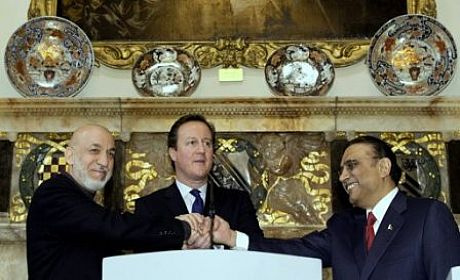Britain’s Mediation between Two of Iran’s Neighbors

What is the background of trilateral meetings between Afghanistan, Pakistan, and Britain? Why has Britain been chosen from among the countries active in Afghanistan?
The London meeting was the third round of these negotiations after Kabul and New York. Nevertheless, if we study the background of Britain's position in this regard, we see that Britain has initiated interaction with the radical movements. Several years ago, Britain negotiated with Taliban leaders in Musa Qala, a move which was later supported by the government in Kabul. Then the Americans rode on this wave and bypassed Kabul and Islamabad. On the other hand, Islamabad, which in the first stage supported the radical movement, due to its weak points lost control of this movement in another stage and later demanded to negotiate with them. The US entered negotiations with the Taliban first in one of the European countries and then based on the Qatar process.
What is the most important issue on the agenda of this meeting?
What is now happening in London’s suburbs with the presence of David Cameron, Britain's Prime Minister, Hamid Karzai, Afghanistan's President, and Asif Ali Zardari, Pakistan's President, and where the Pakistani Army's Chief of Staff is also present based on some reports, is an attempt to legitimize the radical movement. It seems that this meeting attempts take control of negotiations with the radical movement with the support of the Americans or the initiation of these three countries themselves. This is the initiative that is happening right now.
What will, in your opinion, the outcome of these negotiations be?
The winner of this situation is the radical movement. When regional and international powers try to compete with each other in dialogue and interaction, they are legitimizing this movement and the radical movement has learned based on experience that the more it commits crimes, the more it will be rewarded. The crimes that this group committed during the last days of the month of Safar in Pakistan and anti-security occurrences which happen in Kabul on a weekly basis indicate that whenever the radical movement makes radical moves it is rewarded for it. Apparently, these three countries seek to advance their negotiations with the radical movement. The head of the Kabul government has also said that any initiative must be under the control of he himself or his government but it seems that the translation of this situation, under conditions when Pakistan is going to hold elections and it is not clear towards what direction the political situation of this country is going to move and which people will come to power and at a time when Afghanistan is going to hold elections, is the promotion of the status of the radical movement.
Britain's government yesterday (Feb. 4th) announced in a statement that: " This trilateral process has a clear message for the Taliban: Now is the time for everybody to participate in a peaceful political trend in Afghanistan.” It has also been stated that: "As the British Prime Minister has stated before, a stable Afghanistan is not only to the benefit of the Afghan people but also to the benefit of the neighboring countries and Britain.” What is the Taliban's position with regard to this message and this meeting?
The position of the radical movement has, hitherto, been that it will not negotiate with the government in Kabul and consider its negotiating party the foreigners, especially the Americans, but it seems that proposing such a slogan is not realistic. If there is supposed to be talks in Afghanistan, it should basically be held between those who are committed to the constitution. Unfortunately these groups are ignored and instead a new player called the radical movement is proposed. This means that the American and European forces act in contradiction with their statements which is either due to their lack of knowledge or ignoring the reality which leads to the complication of the situation in Afghanistan.
Turkey has also pursued the trend of negotiations between the heads of Pakistan and Afghanistan during past years. At the same time, Qatar has also taken measures in negotiating with the Taliban. Will these processes lead to conclusions in Iran's absence?
Basically, neither Turkey nor Qatar, due to their natural geography and political situation, has a chance to intervene in this matter. When their status does not allow them to enter into these negotiations but it is seen that they are practically present in them, it seems that this is a concession that the international community has rendered them. But under these conditions, they cannot practically be effective. This is a measure taken by the international powers. In fact, Turkey and Qatar act as contractors, but since they do not have any chance they cannot act efficiently in this regard.
How do you view Iran's absence in this process?
What is related to the Islamic Republic of Iran is that Iran had unfortunately enjoyed an influential status in the past but today it does not have such a capacity. It should be pointed out that basically Iran's status has not advanced based on our long-term plans. We should study Iran's position seven or eight years ago when it became involved in this issue and its position at the present time. Unfortunately, this matter holds true for all regional and international issues besides Afghanistan.

